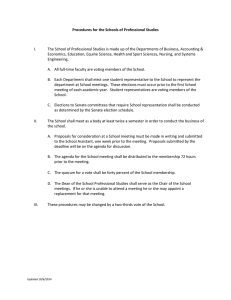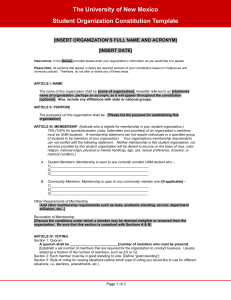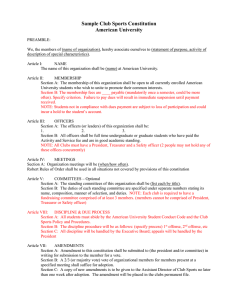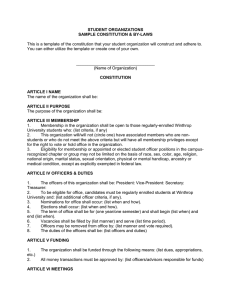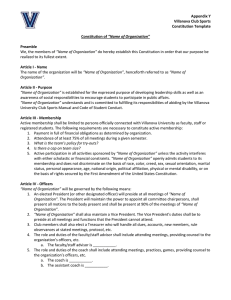Sample Club Constitution Constitution Eastern Connecticut State University
advertisement
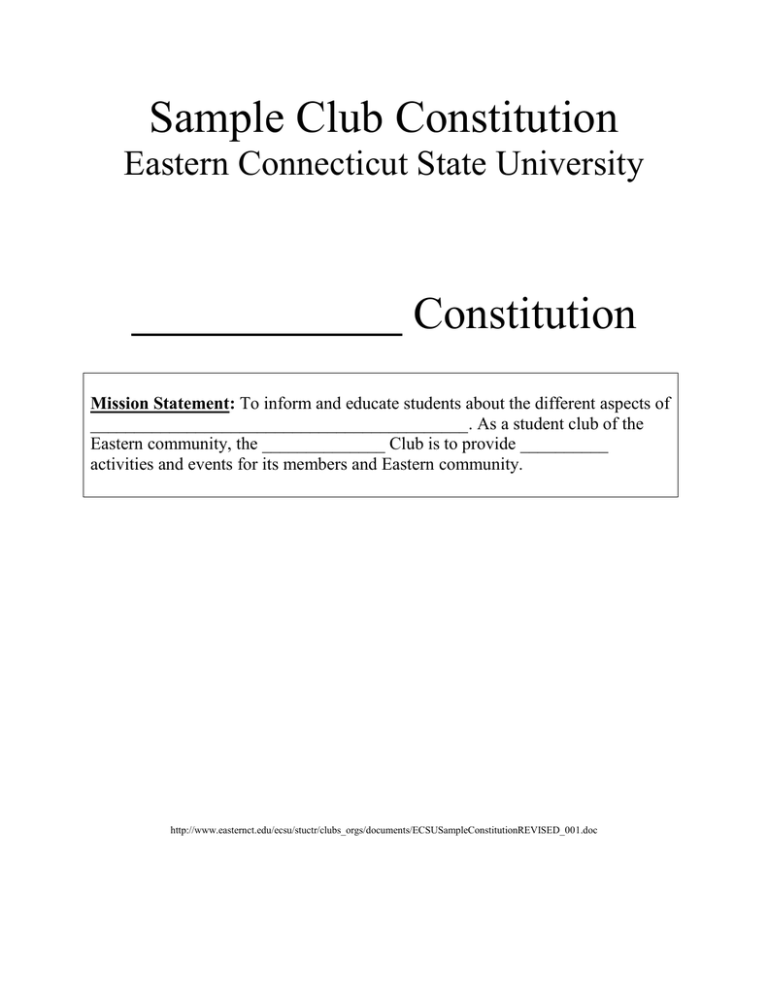
Sample Club Constitution Eastern Connecticut State University Constitution Mission Statement: To inform and educate students about the different aspects of ___________________________________________. As a student club of the Eastern community, the ______________ Club is to provide __________ activities and events for its members and Eastern community. http://www.easternct.edu/ecsu/stuctr/clubs_orgs/documents/ECSUSampleConstitutionREVISED_001.doc ARTICLE I - NAME The name of this club shall be of Eastern Connecticut State University. (Club) ARTICLE II - PURPOSE It shall be the purpose of this organization to . The purpose of the organization should be stated in general terms which set the boundaries within which business may be introduced at the organization’s meetings and the framework within which the organization functions. ARTICLE III - MEMBERSHIP Section 1 This organization will be open to all students currently registered at Eastern Connecticut State University. Section 2 Anyone who attends two consecutive meetings will be considered a voting member of the Club. However, anyone who has two inexcusable absences from regular meetings during the same semester will lose their voting privileges. Section 3 Any voting member unable to attend a meeting for an excusable reason may vote by an absentee ballot. Section 4 Membership shall not be denied to any student because of race, religion, gender, color, ancestry, national origin, age, sexual orientation, disability or veteran status except as sanctioned by federal or state law. If necessary this section should include: classes of membership (active, associate, etc.); any qualifications and/or eligibility requirements any membership fees and dues; dates when fees and dues are payable; penalties imposed when fees and dues are not paid; special requirements for good standing; resignation procedures; honorary membership. ARTICLE IV - EXECUTIVE BOARD & OFFICERS Section 1 The membership of the Executive Board shall consist of the President, Vice-President, Secretary, and Treasurer (other elected or non-elected officials such as committee chairpersons may be included as Members of the Executive Board depending on the needs of the organization.). The Faculty Advisor shall serve as a non-voting ex- officio member of the Executive Board. Section 2 The Executive Board shall have general supervision of the affairs of the organization between its regular business meetings and shall make policy recommendations to the organization. The Executive Board shall be subject to the rules of the organization and shall not act in conflict with actions taken by the organization. Section 3 The Executive Board shall have the power to establish all standing and ad hoc committees of the organization. The President, with the advice and consent of the Executive Board, shall have the power to appoint the chairpersons of all standing and ad hoc committees. Section 4 The Executive Board shall meet weekly (this may vary with each organization) during the academic year. Meetings of the Executive Board shall be called by the President of the organization. Section 5 A majority of the membership of the Executive Board shall constitute a quorum. All decisions made by the Executive Board shall be by a majority vote of the members present and voting. ARTICLE V - ENUMERATION OF POWERS AND DUTIES OF OFFICERS Officers shall perform the duties prescribed by this constitution and by the parliamentary authority adopted by the organization. Duties shall include but shall not be limited to the following. An organization must be careful not to omit any duties that an officer must perform because an omission implies that the duty is not required of the officer. Section 1 The President shall: a. prepare the meeting agendas; b. have the power to call executive board meetings and all regular and special meetings of the organization; c. sign all official papers related to the club (including financial paperwork in the absence of the treasurer); d. have the power, with the advice and consent of the Executive Board, to appoint the chairpersons of all standing and ad hoc committees; e. appoint a temporary secretary to take minutes when the secretary is absent; f. act as the spokesperson for the organization; g. be an ex-officio member of all standing and ad hoc committees except the nominating committee. Section 2 The Vice-President shall: a. assist the president with responsibilities as needed; b. carry out the duties of the president in the absence of the president; c. automatically assume the powers and duties of the President if the President resigns, if the office of President becomes vacant, or if the President is impeached; d. coordinate all social functions of the organization; e. serve as coordinator of all standing and ad hoc committees; f. be an ex-officio member of all standing and ad hoc committees. Section 3 Treasurer shall: a. expend funds as authorized by the membership of the organization as indicated in the organization’s minutes; b. keep an accurate account of all receipts, membership dues, and expenditures of the organization; c. complete, sign, and submit all financial paperwork; d. submit a financial report; e. keep track of the club’s accounts, income, and expenditures; f. give a Treasurer statement of balance at every meeting; g. request financial assistance from the Student Government Association and Budget and Management Committee if needed; h. be responsible for the organization complying with the policies and procedures set forth by the Student Activities office. Section 4 The Secretary shall: a. keep a proper record of all activities of the club, including the minutes of every meeting; b. take attendance at all business meetings of the organization; c. prepare a roll call of members and call it when necessary; d. authenticate by his/her signature all records and documents of the organization; e. carry on the official correspondence of the club; which will be signed by the president; f. give 72 hours of notice of all meetings; g. distribute minutes within 48 hours of the meeting in accordance with the procedure set by the Student Activities Office. In addition to those responsibilities listed here, state and/or national affiliates may require officers to assume other responsibilities and they should also be enumerated in the local constitution. Other officers, along with their duties and responsibilities, required by state and/or national affiliates should also be enumerated in the local constitution. ARTICLE VI - ADVISOR(S) Section 1 The advisor shall be chosen by the membership at a duly constituted meeting of the organization by majority vote. Section 2 The faculty advisor shall serve as a non-voting ex-officio member of the Executive Board. Section 3 The advisors shall give advice for the better performance of the organization. Section 4 The advisor shall meet his/her responsibilities to the organization as stated in written directives issued by the Student Activities Office and in the Club Advisor’s Operating Manual located on the Student Activities Website. Section 5 The advisor shall serve at the discretion of the University. ARTICLE VII - NOMINATION AND ELECTION OF OFFICERS Section 1 Elections shall be held for all offices, including those that are filled temporarily. Section 2 Officers shall be elected for a term of one (1) year or until their successors are elected. They shall hold office until when their successors shall assume office. Section 3 Elections shall be held during the spring semester. Elections shall take place no earlier than March and no later than April of each year. Section 4 Only active members shall be allowed to vote. Voting shall be by secret ballot unless there is only one candidate for an office in which case election may be by voice vote. Section 5 Officers shall be elected by a majority of those members voting in the election. If no candidate receives a majority vote on the first ballot, a revote will occur with the President casting a vote. Section 6 Notification of elections and nominations must be given a week’s notice prior to voting. When an organization has specific eligibility requirements (must be an active member, must have a specific major, must Have a minimum number of credits and/or grade point average) and the organization does not utilize a nominating committee, it should not have nominations and elections at the same meeting. There must be adequate time for the organization to verify a candidate’s eligibility for office. Organizations should provide for a transition period whereby newly elected officers can work closely with current Officers so that there is an orderly transfer of authority as well as official documents and records of the organization. The date of elections oftentimes proves to be troublesome. An organization may wish to include in its constitution provisions that allow it to change the date of elections and/or postpone elections for just cause. ARTICLE VIII - VACANCIES Section 1 In the event of the vacancy of the office of President, the duties will be carried out by the Vice-President. The office of Vice-President will be offered to the Secretary and/or Treasurer. If neither officer wish to fill the Vice Presidency and election for the position will be held. If an existing officer does accept the Vice Presidency an election will be held for the vacant positon. Section 2 In the event of the vacancy of any other offices, the President will appoint a temporary officer and an election will be held as per the provision of Article VI Section 1. ARTICLE IX - IMPEACHMENT AND/OR RECALL Section 1 Any officer is subject to impeachment and /or recall and removal from the office for failing to fulfill his/her constitutional responsibilities. Section 2 An impeachment request must be given at least a week in advance of the actual impeachment voting. Both the request and the voting must take place during regular meetings. Section 3 Upon conclusion of the discussion and arguments for and against impeaching the officer, a vote shall be taken. No officer shall be impeached except by a two-thirds (2/3) vote. Voting shall be by secret ballot. Section 4 An officer who is impeached shall immediately relinquish his/her office but shall be allowed to maintain active membership in the organization unless his/her actions have brought discredit to the organization. Section 5 If an officer is impeached, the organization shall fill the position following the procedures outlined under Vacancies. Article X - Meetings Section 1 Meetings of the organization shall be held at least once a month (or weekly, or biweekly, depending on the needs of the organization) during the academic year. There must be 48 hours of notice of all emergency meetings. Section 2 Quorum… a quorum shall be defined as 50% + 1 member of the club’s total voting membership. A quorum must be present for any action to take place by membership. Section 3 A quorum shall be required to conduct any official business of the organization except to adjourn. Section 4 If voting results in a tie a re-vote will take place with the President casting a vote. Article XI - Amendments Section 1 Amendments to this constitution must be approved by a 2/3 majority of the voting membership present. Making a change to the constitution is called amending the constitution. An amendment is an isolated change. There may be a single amendment or there may be several amendments scattered throughout the document that need to be changed. When extensive changes need to be made in many areas of the constitution it is called a revision. Section 2 Proposed amendments to the constitution shall be automatically tabled until the next scheduled meeting of the organization. Section 3 Prior written notice of the proposed change(s) and the date of the meeting at which the proposed change(s) shall be voted on shall be provided to all members of the organization. Section 4 The constitution may be amended at a duly constituted meeting of the organization by a two-thirds (2/3) vote provided that prior notice has been given. Article XII - Parliamentary Authority Robert’s Rule of Order, Newly Revised shall act as the Parliamentary authority for all meetings of the club. Rules of order are formally adopted written rules of parliamentary procedure that relate to the orderly transaction of business in meetings and the duties of officers in the transaction of business. They are found in the parliamentary authority adopted by the organization. Rules of order include the order of business to be followed by an organization. The typical order of business for an organization is: a call to order, roll call, reading and approval of minutes, report of officers, report of boards, report of standing and/or special committees, unfinished business, and adjournment. Depending on the organization, it may also include an invocation of formal ceremony, reading of correspondence, announcements, good of the order, a program or speaker. When rules of order in the parliamentary authority adopted by the organization do not meet the needs of the organization, the organization can adopt special rules of order that then supersede rules on the same subject. Article XIII - Ratification An organization’s first or original constitution only requires a majority vote of the members in order to be approved. This constitution must be ratified by a majority vote at a regular meeting and approved by the Student Government Association Budget and Management Committee.

